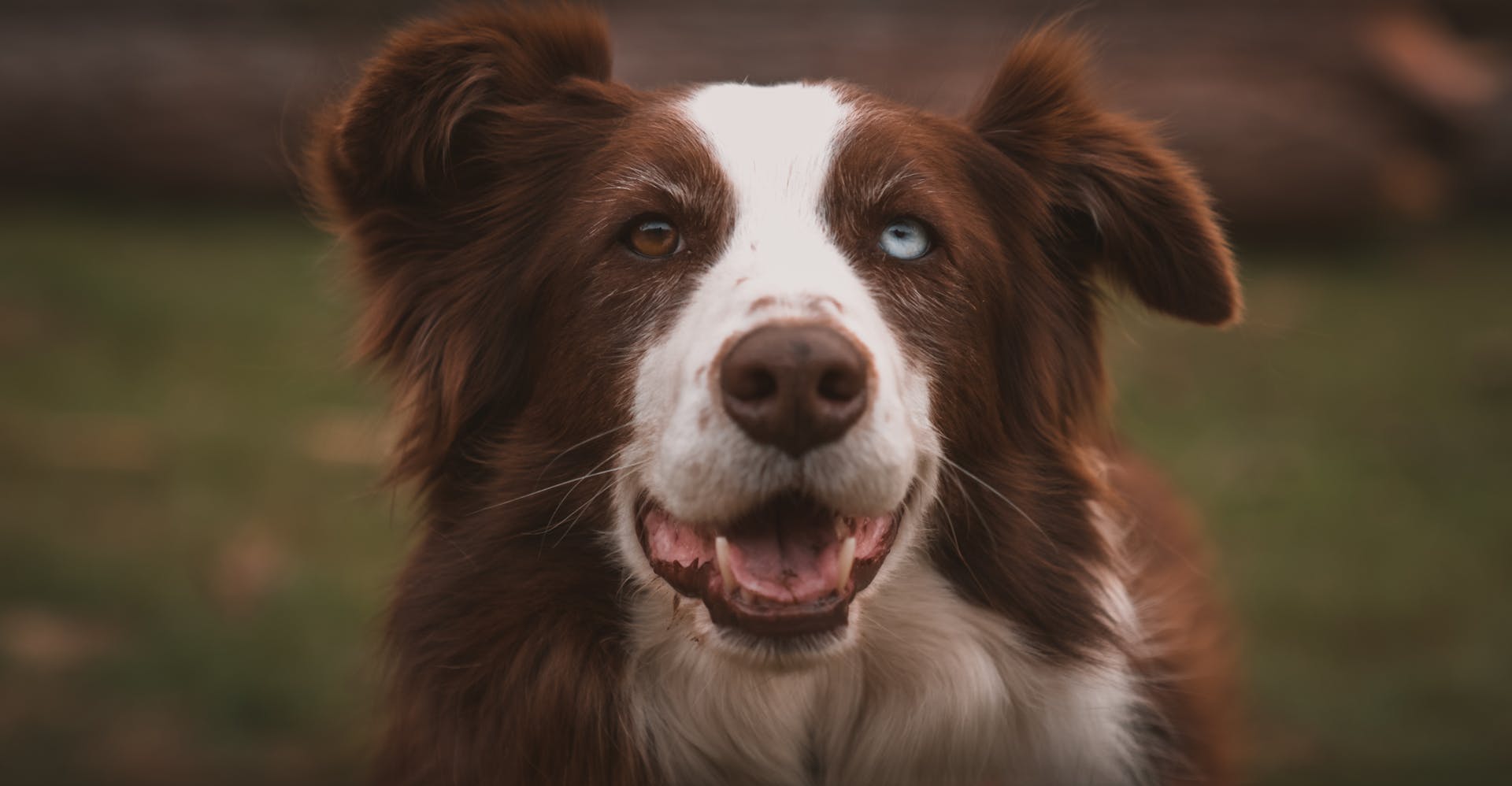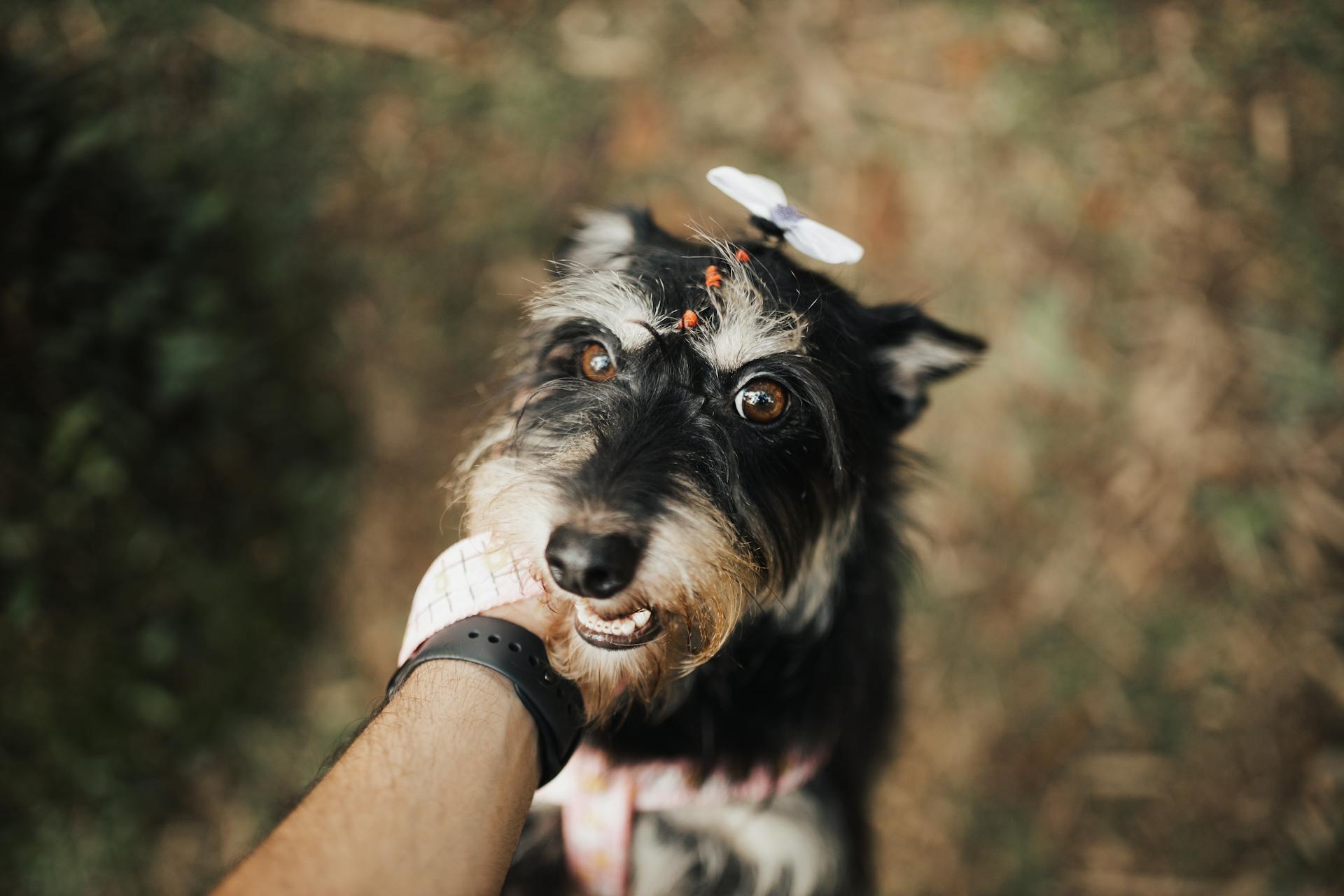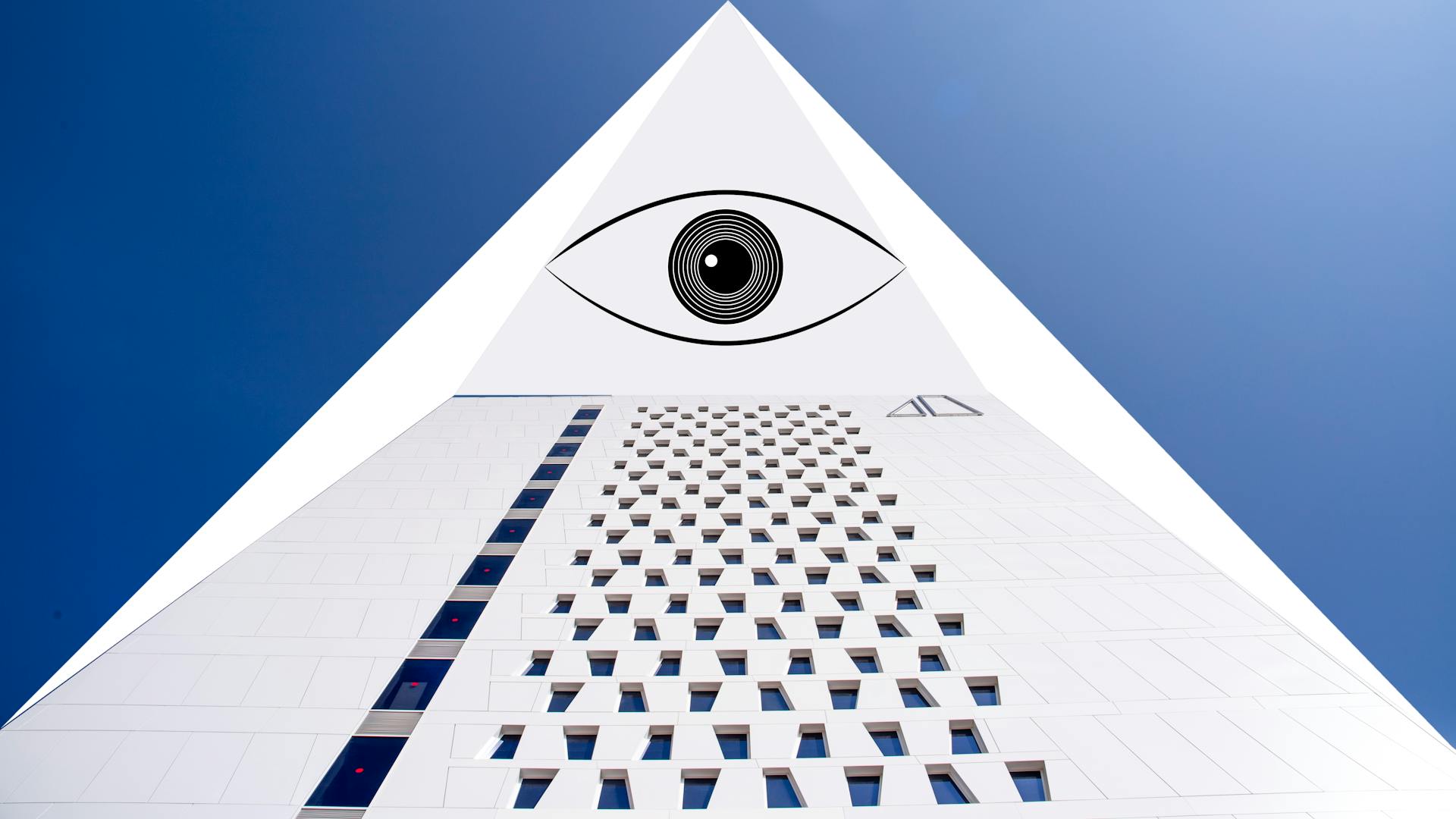
Yorkshire Terriers are prone to eye infections due to their large eyes and delicate facial structure.
The most common cause of eye infections in Yorkshire Terriers is conjunctivitis, which is an inflammation of the conjunctiva, the thin membrane that covers the white part of the eye and the inside of the eyelids.
Symptoms of eye infections in Yorkshire Terriers include redness, discharge, squinting, and pawing at the eye.
Regular cleaning of the eyes with a damp cloth can help prevent eye infections in Yorkshire Terriers.
A different take: Bull Terrier Eyes
Causes and Types of Eye Infections
Eye infections in Yorkshire Terriers can be caused by various factors, including viruses, bacteria, fungus spores, irritants, and parasites. These factors can lead to different types of eye infections, such as conjunctivitis, inflammation of the cornea, tear gland issues, and uveitis.
Some common causes of eye infections in Yorkshire Terriers include viruses like distemper and herpes, as well as bacteria like canine brucellosis and leptospirosis. Fungus spores, irritants like smoke and shampoo, and foreign matter like dirt and grass seed can also contribute to eye infections.
Discover more: Boston Terrier Cherry Eye
In some cases, trauma, scratches, or cuts on the cornea can cause eye infections. It's essential to monitor your Yorkshire Terrier's eye health and seek veterinary care if you notice any signs of eye discomfort or infection.
Here are some common types of eye infections that can affect Yorkshire Terriers:
- Conjunctivitis (Pink Eye) - an inflammation of the mucous membrane that covers the outer portion of the eyeball and the inside of the eyelids
- Inflammation of the cornea
- Tear gland issues or physical abnormalities of the eyelid
- Uveitis - an inflammation of one or more inner structures of the eye such as the iris, ciliary body, or choroid
Yorkshire Terriers may also be prone to other eye infections, such as keratoconjunctivitis sicca (dry eye), corneal ulcers, and glaucoma. These conditions can cause symptoms like redness, discharge, and excessive tearing, and can be serious if left untreated.
Signs and Symptoms
If your Yorkie is showing signs of an eye infection, it's essential to catch it early. Redness or irritation in the eyes is a common sign, often accompanied by watery or excessive discharge, which may be yellow or green in color.
Squinting or blinking abnormally can indicate discomfort in the eyes. Rubbing or pawing at the eyes is also a symptom to watch out for.
Broaden your view: Yorkshire Terrier Eyes
Other signs to look out for include sensitivity to light, cloudiness, or a color change in the eyes. If you notice any of these symptoms, seek veterinary care as soon as possible.
Here are some common symptoms of eye infections in Yorkies:
- Redness or irritation in the eyes
- Watery or excessive discharge (yellow or green in color)
- Squinting or blinking abnormally
- Rubbing or pawing at the eyes
- Sensitivity to light
- Cloudiness or a color change in the eyes
Keep in mind that early intervention is key to preventing complications from eye infections. Regular eye examinations and good hygiene practices can also help prevent infections in the first place.
How to Prevent and Clean Problems
Preventing and cleaning problems in your Yorkshire Terrier's eyes is crucial for their overall health and wellness. Regularly cleaning around the eyes, and using a gentle and dog-friendly eye wash solution can help reduce the risk of infections.
You can use plain water, or buy saline solution, which can help soften the gunk that builds up in your Yorkie's eyes. This can be especially helpful if you notice crusty green goop in and around their tear duct.
Grooming your Yorkie regularly will also help prevent tear stains and other eye problems. Keep the fur short around their eyes to eliminate the possibility of long fur getting into the eye and irritating them.
To clean your Yorkie's eyes, you can use a variety of methods, including cotton balls, dog wipes, canine rinse, and DIY cleaning solutions. Here are some easy ways to keep your Yorkie's eyes healthy and inflammation-free:
- Cotton balls
- Dog wipes
- Canine rinse
- DIY cleaning solutions
It's also a good idea to have a daily routine with your Yorkie, where you clean and check their eyes regularly to make sure there is no build up of eye discharge. This can help prevent excessive eye discharge and reduce the risk of eye infections.
If you do notice any eye discharge, you can try to remove it by gently holding a warm damp cloth over the affected area to moisten the crusty eye gunk. Be sure to refresh the cloth regularly to keep it warm.
Regular veterinary check-ups are also important for catching any potential eye infections early and preventing them from becoming more serious. Your vet can provide expert advice on proper eye care and any necessary treatments.
Treatment and Prevention Strategies
Treatment for a Yorkie's eye infection depends on the underlying cause, but may involve a combination of topical and oral medications, or in some cases, surgery.
A veterinarian will typically prescribe antibiotics and eye drops if a bacterial infection is the underlying cause. If allergies are suspected, an antihistamine may be prescribed to help soothe the dog's eyes.
To prevent eye infections in Yorkies, it's essential to have a daily routine that includes cleaning and checking their eyes regularly to ensure there is no build up of eye discharge. Regular veterinary check-ups are also crucial for catching any potential eye infections early.
Here are some tips to help prevent eye infections in Yorkies:
- Regularly clean around the eyes with a gentle and dog-friendly eye wash solution.
- Trim the hair around the eyes to prevent irritation and keep the area clean.
- Provide a balanced diet with essential vitamins and nutrients, such as vitamin A, omega-3 fatty acids, and antioxidants.
- Keep the area around your dog's eyes clean and free from anything that could irritate them.
By following these tips and consulting with a veterinarian, you can help prevent eye infections and ensure your Yorkie's eyes stay bright and healthy.
Treatment of
Treatment of dog eye infections typically involves a combination of medications and ointments prescribed by a veterinarian. These may include antibiotics to help clear up the infection and reduce inflammation.

Antibiotics and eye drops are commonly prescribed for bacterial infections, while antihistamines may be used to soothe the eyes in cases of allergies. Surgery may be necessary to remove foreign bodies or debris, or to correct eyelid or eyelash abnormalities.
In severe cases, surgical interventions may be necessary, such as eyelid surgery to correct a congenital defect or to remove an irritating foreign object. Prompt and appropriate treatment is essential to prevent long-term damage to your dog's vision and overall eye health.
Here are some possible treatments for dog eye infections:
Consult your veterinarian for advice on the best course of treatment for your dog's eye infection, as the underlying cause will determine the most effective treatment.
Prevention Strategies
Regularly cleaning around your Yorkie's eyes is essential for preventing eye infections. This should be done daily, and a gentle, dog-friendly eye wash solution can help reduce the risk of infections.
Rolling up the windows in moving vehicles can prevent the wind from drying your Yorkie's eyes and adding to irritation. This is especially important in preventing excessive eye discharge.
Trimming the hair around your Yorkie's eyes can prevent irritation and keep the area clean, which is crucial for maintaining their overall health and wellness.
Providing a balanced diet with essential vitamins and nutrients like vitamin A, omega-3 fatty acids, and antioxidants can contribute to healthy eyes.
A unique perspective: Yorkie vs Yorkshire Terrier
When to Visit the Veterinarian
If you notice your Yorkshire Terrier's eyes are watering excessively, are red, or they have had purulent discharge that has continued for 48 hours, take them to the veterinarian as soon as possible.
Eye infections, abnormally located eyelashes, and dry eye can all be painful for your dog, so if you observe that your dog is blinking excessively, squinting, or showing obvious sensitivity to bright lights, it's likely that your dog is suffering from discomfort and needs veterinary attention.
If your dog is pawing at or rubbing their eyes, this is a further indicator of irritation and pain.
Here are some warning signs to look out for:
- Excessive watering or redness in the eyes
- Purulent discharge that lasts for more than 48 hours
- Bulging or swelling eyes
- Dilated pupils
- Blinking excessively or squinting
- Showing sensitivity to bright lights
- Pawing at or rubbing their eyes
By being aware of these warning signs and taking your dog to the veterinarian promptly, you can help prevent serious complications and ensure your Yorkshire Terrier maintains good eye health.
Frequently Asked Questions
How do you treat an eye infection in a Yorkie?
Yorkies with eye infections require a veterinarian's care, including prescribed oral antibiotics and anti-inflammatory drugs to clear the infection and reduce swelling
How do I treat my dog's eye infection at home?
To treat your dog's eye infection at home, rinse the affected area with a saline solution and gently wipe away discharge with a damp cotton ball. You can purchase saline solution or make your own with salt water to help soothe and clean your dog's eye.
Can a dog's eye infection heal on its own?
No, a dog's eye infection typically requires veterinary attention to prevent blindness and alleviate pain. Prompt veterinary care is essential to treat the infection effectively.
Sources
- https://www.vscot.com/site/blog/2021/05/17/dog-eye-infection
- https://yorkies-gram.com/cleaning-yorkie-eyes-the-complete-guide/
- https://www.cuteness.com/article/eye-discharge-yorkies
- https://theyorkietimes.com/yorkshire-terriers-and-eye-infections
- https://www.vets-now.com/pet-care-advice/dog-eye-infection/
Featured Images: pexels.com


